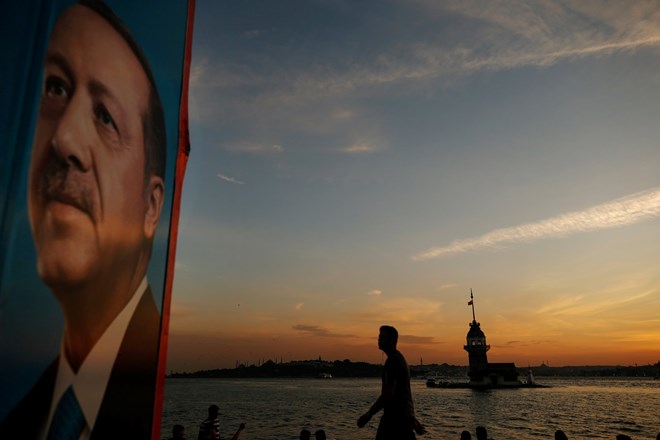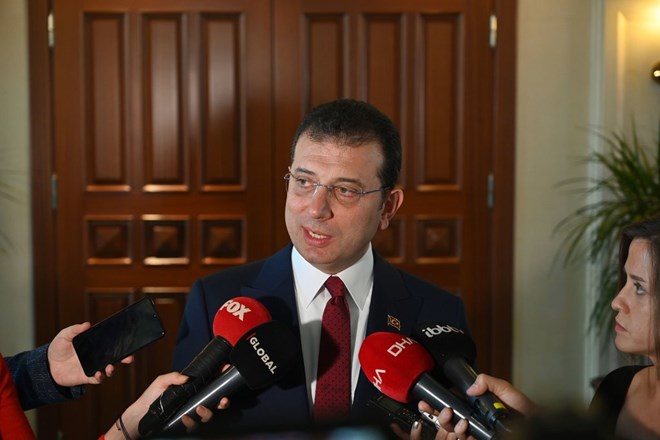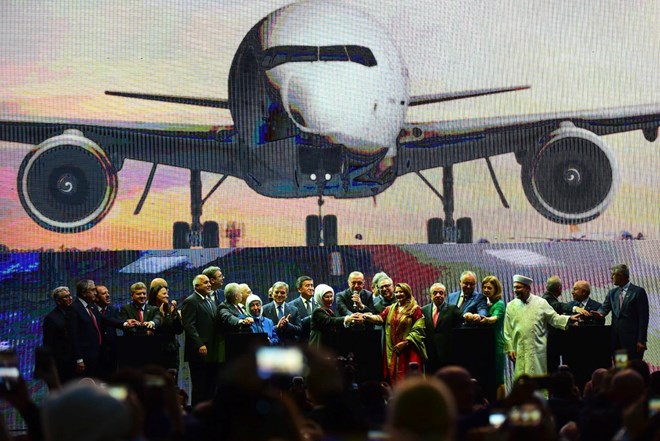
Wednesday December 25, 2019
By Carlotta Gall

After reviewing his city’s books, the new mayor of Istanbul, Ekrem Imamoglu, said he would battle a $100 billion plan to cut a new shipping lane parallel to the Bosporus Strait.Credit...Emrah Gurel/Associated Press
ISTANBUL — The new mayor of Istanbul, Ekrem Imamoglu, has spent the last six months since his election combing over his city’s books to get a handle on how it had been run under his predecessor, an ally of President Recep Tayyip Erdogan.
On Monday, the mayor issued his verdict: a level of mismanagement and overspending that surpassed all expectations.
Things were so bad that the mayor even used a news conference to declare battle against one of Mr. Erdogan’s favorite projects, a $100 billion plan to cut a new shipping lane parallel to the Bosporus, announcing that the city was withdrawing from a protocol signed by his predecessor for what has been called Canal Istanbul.
The declaration was the mayor’s first real challenge to Mr. Erdogan and the powerful vested interests that have supported him since he took control of Turkey’s largest and wealthiest city, long the power base for the president and his governing party.
Mr. Imamoglu won a stunning upset to become mayor in June after the president’s party contested his apparent victory in an earlier election in March, forcing a rerun.
He took office promising to get the city’s books in order after mounting accusations by the opposition that the municipal finances had been used to the benefit of the president as well as his party, cronies and family.
In doing so, Mr. Imamoglu has quickly emerged as a strong national challenger to the president, whose popularity has waned as the economy slowed after a long stretch of unbroken growth.

Ekrem Imamoglu, the mayor of Istanbul, has emerged as a strong national challenger to President Recep Tayyip Erdogan of Turkey.Credit...Ozan Kose/Agence France-Presse — Getty Images
Much of that growth was fueled by grandiose construction projects favored by Mr. Erdogan’s administration, the foundations of which the markets, economists and the president’s critics have questioned.
Increasingly, it seems, the bill on the spending binge is coming due.
Istanbul and its subsidiaries were in debt to the tune of 14 billion lira, roughly $2 billion, when he took over in June, Mr. Imamoglu said on Monday. The municipality’s subsidiary companies were paralyzed by tax debts and effectively bankrupt, he added.
The outgoing mayor, an official appointed by Mr. Erdogan, had even received, and spent, a highly unusual advance of funds from the Treasury, leaving the incoming administration unable to pay municipal salaries, he said.
“After a week there was not a single penny in our budget to pay personnel,” he said.
At a recent budget meeting that was televised on the municipal channel, Mr. Imamoglu went into more detail, showing how spending had outpaced revenue over the last five years. Payment obligations, most of them foreign currency loans, had soared to more than 60 billion lira, or $10 billion, he said.
“Financial discipline has gotten out of control from 2013-2014,” Mr. Imamoglu said at the meeting. “The past five years are a complete disaster in terms of financial management.”
The discoveries by the mayor and his team have cast a harsh light on how Istanbul has been run under Mr. Erdogan, who has dominated the city’s affairs for the better part of 25 years, first as mayor in the 1990s and later as prime minister and president.
Mr. Erdogan gained enormous popularity by providing public services from trash collection to mass transit. But he also oversaw enormous urban sprawl that critics say has irreparably ruined the fabled city.
Those projects also made the president’s immediate circle of family and political allies fantastically rich through a system of kickbacks and cronyism, his opponents charge.
Mr. Imamoglu, who is a potential presidential candidate for the opposition Republican People’s Party and is mindful of not alienating Erdogan supporters, has been cautious in revealing too much dirt about the previous mayoral administration or about the president himself.
But Tarik Balyali, a member of the municipal assembly from the same opposition party, has been more outspoken.
As soon as the new mayor took office, Mr. Balyali, who serves on the inspection committee, went looking for answers in the municipality’s database.
In particular he wanted to find an internal report on Istanbul’s spending on foundations and charitable organizations linked to Mr. Erdogan’s family, which governing party officials had denied existed.
The report had been deleted from the database, but software engineers were able to retrieve it within a day, he said. “In the digital age nothing is secret,” he said.
The municipality’s debt had increased fivefold in the last five years, Mr. Balyali said. Much of the increased spending occurred in the run-up to two election campaigns and was probably diverted to pay for the governing party’s election machine, he said.
Citing one example, he said that 185 million lira, or $31 million, had gone to a municipal gardening company two months before the 2018 presidential election.
“Clearly there was a need for flowers,” Mr. Balyali quipped.
“It was to finance the election campaign, propaganda, meetings and posters,” he added.
“They had won elections in Istanbul for 20 years,” he said of Mr. Erdogan’s Justice and Development Party. “They thought they could do anything.”
There was frequent overpricing of public contracts, Mr. Balyali said, adding, “Something that cost 10 lira was going for 100.”
He described a contract in which the municipality agreed to pay more than the normal rate for 65,000 units of drinking water. “Where is that money going except into someone’s pockets,” Mr. Balyali said.
The true ownership of companies that won municipal contracts was often obscured behind a front person, sometimes the real owner’s neighbor or employee, he said.
The really big money was in real estate and infrastructure development, and the members of the incoming administration found evidence of what they had suspected for years.
Among the biggest prizes were an extension to Istanbul’s new airport, a high-speed rail link to the capital, Ankara, and Istanbul’s road and metro tunnels, each worth billions of dollars. Leaks of intercepted phone conversations published online in 2014 showed company bosses discussing the billions of dollars they were expecting in public contracts overseen by Mr. Erdogan and his transportation minister at the time, Binali Yildirim.

Mr. Erdogan, center, during the opening ceremony of Istanbul’s new airport in October, 2018.Credit...Burak Kara/Getty Images
In 2017, Istanbul awarded five contracts to build parts of the subway system. In total they were worth almost 1.2 billion lira, or $202 million, above what the municipality had estimated, Cigdem Toker, an investigative journalist, reported in a recent book.
The contracts were given to a handful of companies known to be close to Mr. Erdogan under a new regulation that effectively allowed for a closed process.
Mr. Imamoglu said he was abandoning such practices, and has already saved money by canceling several expensive new projects that he said were unnecessary.
Among those are a solid waste plant, parking lots and a multibillion dollar tunnel along the European shore of the Bosporus, Mr. Balyali said.
Yet Mr. Imamoglu’s hands are tied for many projects in which contracts are signed and work already begun, including several of the subway deals.
For almost decade, Tayfun Kahraman headed the Istanbul Chamber of Urban Planners, a professional association, and he brought more than 100 court cases against the Istanbul municipality and its partners for projects that contravened the city’s building regulations.
In September he joined the new mayor’s team.
The municipality was halting what it could, he said, including two road tunnel projects, and was considering using one for mass transit instead. As for the overpriced subway contracts, the city had no choice but to keep going, he said.
Mr. Imamoglu announced that he had secured new financing in Europe and that work was restarting on three subway lines.
The big battle on the horizon is Canal Istanbul, the proposed new shipping lane, Mr. Kahraman said.
Mr. Erdogan has declared his determination to go ahead with the plan to respond to growing sea traffic from the Black Sea to the Marmara Sea.
Mr. Kahraman criticized the plan on every level: social, environmental and financial.
He said he doubted that Mr. Erdogan could raise the billions needed to build the canal. But even if he could, Mr. Kahraman said, the projected costs of the canal would be enough to be used instead to make a third of Istanbul’s existing housing stock earthquake safe.
He said municipal planning, which has been scrapped, showed extensive real-estate development along the route of the canal, suggesting to him that the project was predominantly a moneymaking endeavor.
“You cannot bring Istanbul on this risky journey,” Mr. Imamoglu warned at the news briefing, “and a few people cannot bring things to this pass.”